In a single average working day, employees must shuffle between a multitude of different apps, websites, etc., a thousand times to curate data, catalog information, send and receive messages, etc.
In conducting these repetitive & robotic tasks, precious time that can be better utilized on more critical and strategic tasks that require their unique skills, perspective, or expertise gets backtracked.
If you are wondering, “wouldn’t it be nice if we were just able to automate a bunch of those tasks to get rid of excessive and unnecessary workload”, then you’re right. Ergo the need for task automation software arises!
We’ll need to understand what task automation is in the first place before we dive deeper into software tools that enable us to automate tasks.
So join me as I take you on a ride with me into the world of task automation!
What is task automation & why should I care?
When I talk about task automation, I am talking about streamlining a given process or collecting tasks using automation. This usually entails software that can listen to your apps for business events or triggers and then offer real-time business outcomes, or actions, in your apps once they’ve been discovered.
The contrast between task automation and workflow automation is essential. While the former focuses on optimizing specific, recurrent tasks, the latter focuses on streamlining processes from start to finish by integrating apps, data, and teams.
For the time being, we’ll concentrate on task automation, but in the end, we’ll create a platform that allows you to automate both tasks and workflows.
Top 8 task automation software you need to know about!
Now that we understand how to select the best task automation software for your business, it is time to put that knowledge to the test. Do you find yourself or your team wasting a significant amount of your precious time on mundane tasks?
Tasks such as; data entry, sending out emails, etc., are highly laborious to do and can cause a strain on your daily operations. If you feel pressure from these types of tasks, then it is time for you to look at task automation software tools for your business.
The following are the top eight task automation tools that, according to us, are the best of the best:
1. ProofHub
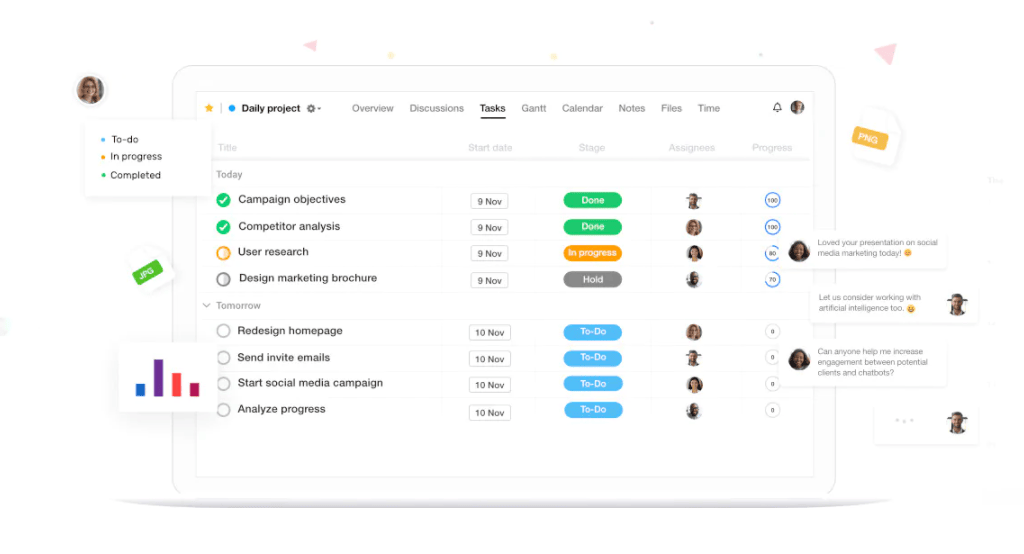
ProofHub is one of the leaders in the task automation software industry, offering many task management capabilities. It helps in assigning tasks, tracking time on recurring tasks, and provides you a birds-eye view to see the progress of your projects all in one place.
ProofHub’s core platform makes it fundamentally easier to strategize, cultivate, capture, handle, and report on work anywhere. Thus enabling a much more comprehensive work environment that can get more done. Track and register crucial metrics and contact real-time updates are a task that flawlessly moves within an automated workflow specially made to fit the needs of your team perfectly.
There’s no telling how much more work teams can achieve in the same amount of time when they have clarity about their work.
Cost: The two pricing tiers offered by ProofHub are Essential and Ultimate Control, and they have fixed monthly prices of $45 and $89 that are billed annually. For new customers, the platform offers a 14-day free trial period.
2. Zapier
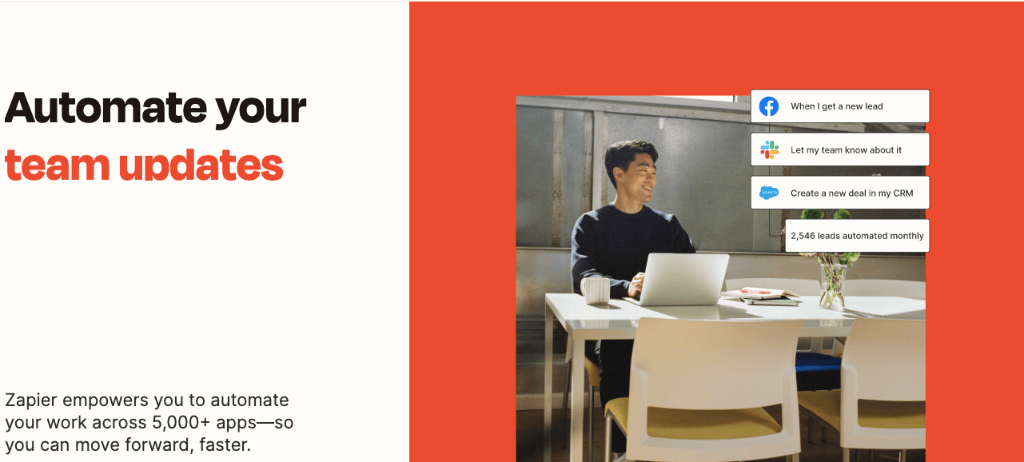
Zapier is one of the most popular software for automation available on the market. Zapier as a platform is an extremely comprehensive tool with a top-notch and highly versatile user interface that makes it an excellent platform for small to medium businesses across many industries.
Zapier enables your team to boost work efficiency by eliminating tasks that they find redundant by creating automated procedures for them. A cherry on top of Zapier is its stellar third-party integration across platforms like; Dropbox, Google Drive, Google Sheets, Slack, Google Alerts, Hootsuite, Jotform, Twitter, and much more. With Zapier, you can automate your tasks and transfer information across apps.
Cost: Pricing plans have a free option with limited functionality along with the starter plan being $19.99/Month to the most comprehensive plan being $599/Month.
3. Jotform

Jotform is a fantastic tool for automating your workflow, depending on how you utilize it. You can use the extensive library of pre-made templates or develop your custom forms using Jotform to save time. Apps for automation like Zapier, Airtable, and Trello are all integrated with Jotform.
Turn Jotform into a marketing automation tool by integrating it with other apps and programs. You can personalize autoresponder emails, produce dynamic documents that alter in reaction to a user’s form submission and responses, and more.
You can get all the benefits of expensive process automation software for less money with Jotform. Take into account either the free starting account or a premium alternative.
Cost: Pricing plans start from a starter plan that is completely free with limited functionality. The platform has three paid plans; Bronze, Silver, and Gold, which cost $24/Month, $29/Month, and $79/Month, respectively. The platform also has a custom pricing plan option for larger teams called Enterprise.
4. IFTTT
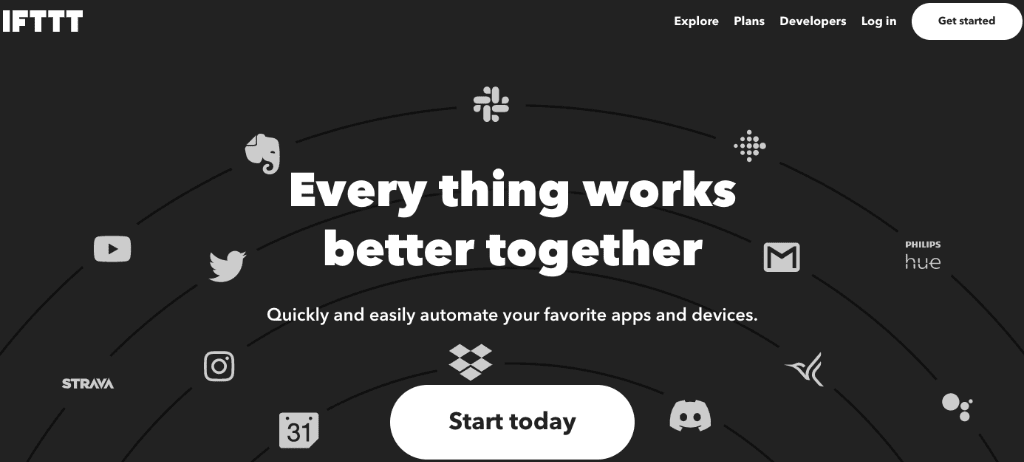
IFTTT offers many of the same benefits as Zapier, though it’s not quite as versatile. IFTTT works across multiple industries, including financial technology, subscription services, smart home, and energy. With IFTTT Pro, you can customize Applets and use queries, conditional logic, and multiple actions to trigger the process you want to automate.
IFTTT allows you to efficiently operate across multiple industries; FinTech, IoT, and B2B; the scope of the platform is limitless. On top of that, IFTTT also offers a Pro version where you can create custom Applets and use conditional logic, queries, and multiple actions to trigger the process you want to automate.
Cost: Free is IFTTT Standard. IFTTT Pro is a premium subscription with monthly prices ranging from $1.99 to $9.99.
5. Power Automate
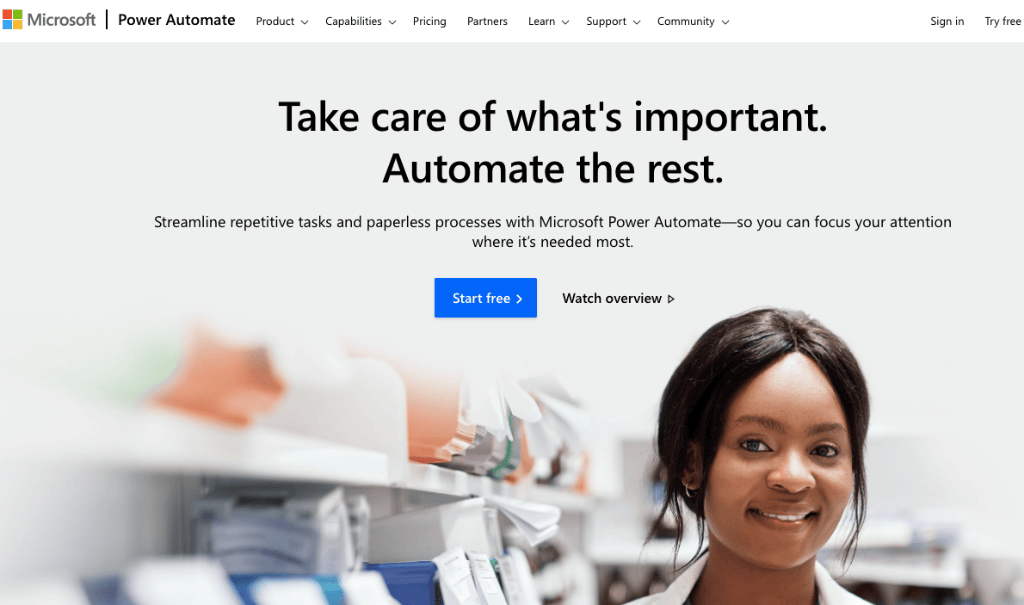
Power Automate was started by Microsoft in 2016 as the company’s answer to the growing demand for repetitive task software. Today’s platform has integrations with 83 third-party applications, with the list growing at regular intervals. Suppose you or your team operate with Microsoft services like Outlook or rely heavily on other Microsoft-developed platforms for your work. In that case, this task automation tool might be worth the shot for you due to its seamless integration across the Microsoft ecosystem.
Cost: The base starts at $15 per user/month and goes up to $40. per user/month. You can also pay per flow, costing you $100/flow.
6. Hive
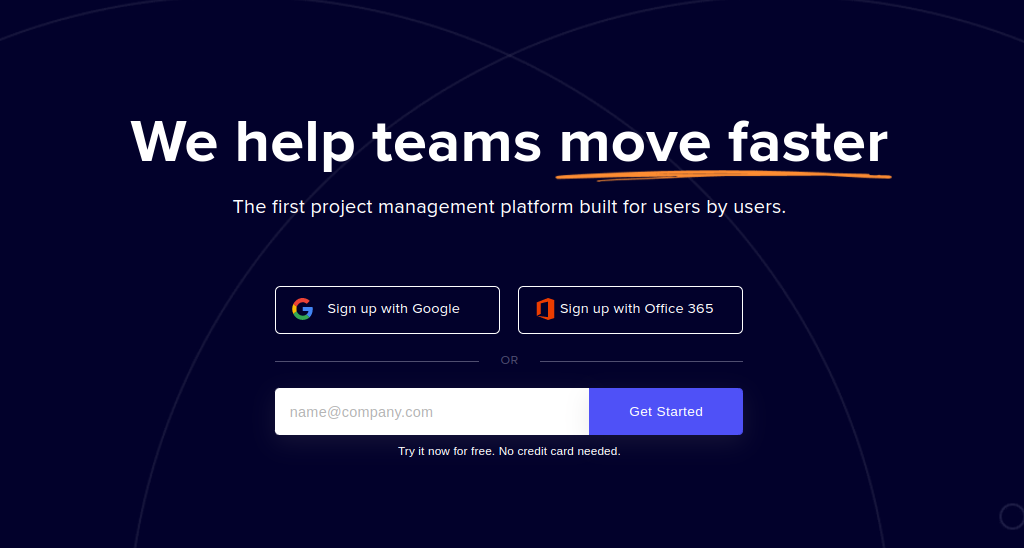
Hive is a well-known project management platform that provides both in-app automation and interfaces with third-party apps to assist you in developing the ideal streamlined workflow. You can access the power of these tools right inside the Hive workplace thanks to Hive’s direct integrations with tools like Zoom, Slack, Gmail, and Dropbox. What about the rest of the equipment you employ daily? Hive Automate can help in this situation.
Cost: The platform offers a 14-day free trial. The starter plan begins at $12 per user per month after the free trial period.
7. Keap

Keap is a stellar tool well-known for its performance as an all-in-one platform for sales, CRM, and marketing automation. Keap, formerly Infusionsoft, is the ideal automation technology for small businesses with fewer than 25 employees to generate leads and close transactions.
From lead generation and contact management to email marketing and automation, Keap provides all the capabilities required to automate your sales process. To maximize the effectiveness of your automation workflows, Keap also connects with other programs like Salesforce, Google Apps, and Zapier.
Cost: Pricing starts at $79 per month and goes up to $299 monthly for enterprises.
8. Airtable
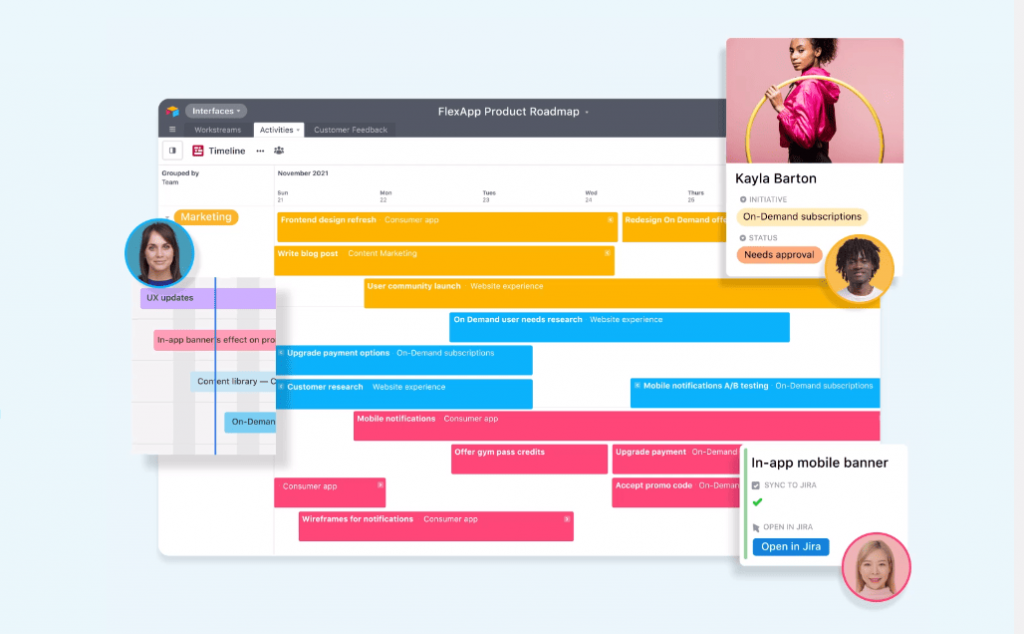
Airtable is a simple and easy-to-use solution for teams looking to transition to automation quickly. Onboarding is made simpler by Airtable’s pre-built templates. The platform enables integrations with well-known tools, including Facebook, Twitter, Google Workspace, and Slack. With the ability to display projects and tasks on grid-like views, Kanban boards, Gantt charts, and calendar views, Airtable as a project management tool offers a truly collaborative experience.
Cost: Up to five creators or editors are included in Airtable’s free plan. Several premium features, including custom-branded forms and automatic table syncing, are available with the $10/month Plus subscription.
Read more: Best Airtable Alternatives Worth Considering
Benefit of task automation software
The benefits of task automation are manifold. It can streamline processes, improve efficiency and accuracy, reduce human error, and eliminate mundane tasks.
The use of task automation is becoming more prevalent in the workplace. This is because it can help businesses achieve their goals by improving efficiency and accuracy while reducing human error and eliminating mundane tasks.
Task automation has core intrinsic benefits that many businesses tend to miss. The innovative blend of new and emerging technologies powered by AI, predictive analytics, and Machine Learning allows employees to automate business functions. The right tools at the disposal of a business will enable it to extract the following benefits from repetitive task software.
- Cost reduction
- Productivity increase
- Higher rate of system availability
- Better task accuracy
- Increased reliability & performance
- Freeing up precious human resource
- Revitalized focus on strategic actions & tasks
Identifying the three fundamentals of task automation
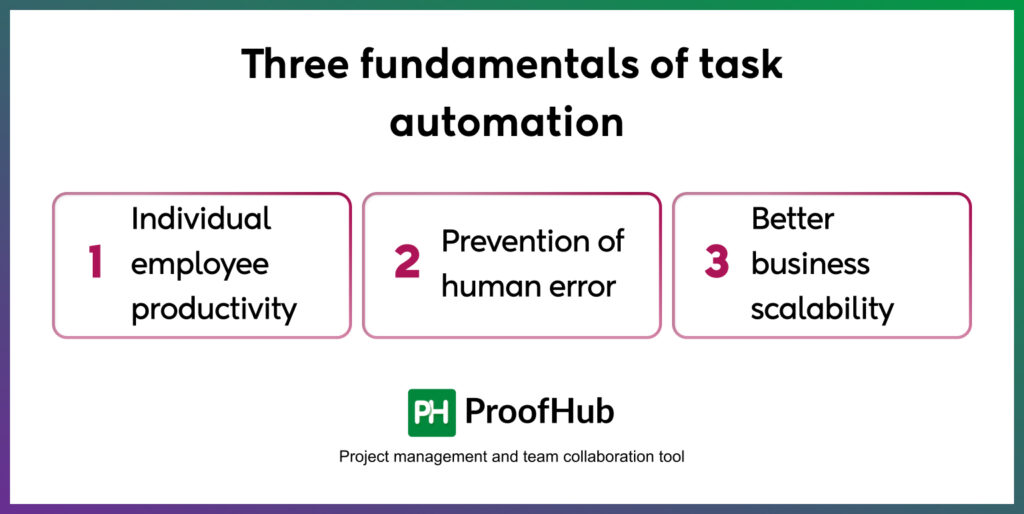
Now we understand the general benefits of using task automation. Hence, we must explore the three fundamentals of what makes task automation so critical for modern businesses:
1. Individual employee productivity
It is no secret that task automation can increase work prolificity. Increasing productivity in the workplace has been a goal for many years, and task automation has been a valuable tool to help achieve this goal.
Task management software is not just for the office environment. It can be used by anyone who needs to manage tasks, from freelancers and entrepreneurs to parents and students.
Productivity is one of the most critical factors that determine success. One of the best ways to boost productivity is by automating tasks. Task automation allows you to do this, and it makes your life easier by freeing up your time for other tasks.
Task automation helps you by providing a platform for managing your tasks and responsibilities. It also allows you to automate repetitive tasks to happen without any input from you. This saves time and effort, which in turn boosts your productivity levels.
2. Prevention of human error
As previously stated, manual and arduous processes/tasks frequently result in errors. Manually entering data into spreadsheets, for example, has an 18 to 40% risk of resulting in human error.
These mistakes can have a wide range of consequences for your company. It can cause you to bill clients incorrectly; it can cause HR team members to transmit secret papers to the wrong set of employees; it can cause customer complaints to slide through the cracks—and so on.
Automating tasks prevents issues like the ones mentioned above, allowing your organization to run more smoothly and your staff to spend less time resolving self-inflicted issues.
3. Better business scalability
Businesses are looking for ways to grow and scale without adding more people to the team. Task automation is one of the best ways to achieve this.
Task automation has been around for a while, but it has taken off recently. This is because many companies now realize the benefits of task automation which helps them scale their business with less work.
The main benefit of task automation lies in its ability to speed up processes that would otherwise take much time, effort, and resources. It also reduces errors caused by human error or lack of attention to detail.
When does a task need to be automated?
There are many reasons why you would want to automate a task. One of the most obvious ones is that it saves time and effort.
You will spend more time on other tasks that may have been neglected due to the time spent on the automated task. Another reason you might want to automate a task is if it is repetitious and boring.
Automating this task will focus on more exciting tasks while still getting some work done. Automation can also help with accuracy, consistency, and quality control.
If a task is repetitive, then there is a higher chance of human error in the process, leading to mistakes or inconsistencies in your work. Automating this type of process helps eliminate these errors and ensures that your work has high-quality standards every time.
Understanding the need for task automation software
Task automation is any tool or piece of software that can be used to automate performing tasks. Task automation has become an essential part of the workplace as it helps streamline work and save time.
It is also an excellent way for employers to improve productivity and reduce costs. Task automation can be used in any industry, but it is prevalent in customer service, legal, and finance industries because of the repetitive nature of their work.
Fundamentally, task automation is a type of software that is used to automate repetitive tasks. There are many benefits to using task automation.
For example, it can save time, improve efficiency and accuracy, and create a more streamlined workflow. Repetitive task software provides an easy way for users to automate repetitive tasks. It can be used in any industry and for any business.
The main benefit of this type of software is that it also improves accuracy by automating the process, resulting in fewer mistakes being made when completing the same tasks repeatedly.
This can also help improve efficiency because it reduces time spent on repetitive tasks. Hence, more time is available for other things like getting creative or focusing on different aspects of your business.
Task automation as a core principle is ubiquitous as the technology to reduce or remove the requirement for human participation in completing a task is widespread.
We encounter; airport check-in kiosks, ATMs, fast food ordering, medication refills, and subscription services in our daily lives, all of which are great examples of task automation in our daily lives. At least one step in the process has been automated, removing the human factor.
How can task automation software help your business
Businesses need task automation to streamline their processes, save time and money, and improve the quality of their products and services. Task automation is a way to improve productivity by automating repetitive or tedious tasks. These tasks can be anything from data entry to financial analysis.
When businesses automate tasks, they free up resources to focus on more important work. They also have more time to devote to improving their products or services. Task automation tools help businesses automate tasks by making them easier for them. This software streamlines the process of task automation and makes it accessible for any size business regardless of budget.
Smaller businesses are more likely to automate tasks. They can’t afford to hire a full-time worker for every task to be completed. However, larger enterprises are also automating tasks to streamline their business processes. Businesses need task automation because it helps them save time and money and improves their workflow.
Businesses today have to manage a multitude of repetitive tasks and hence are the prime candidates for automation. Here are the top ten tasks that you can automate today:
- Creating a report
- HR requests (employee hiring/termination)
- Software/hardware/technology demands
- Scheduling appointments
- Paying bills
- Invoicing/accounting
- Posts on social media
- Email answers
- Word processing
- Data mining & extraction
“Even minor mental barriers generated by transitioning between tasks can cost as much as 40% of someone’s productive time,” according to the American Psychological Association. So, why not automate everything you can?
Consider the benefits of using technology rather than humans to assess which duties your organization should automate and the value individuals may bring by focusing on other activities.
The different types of task automation software
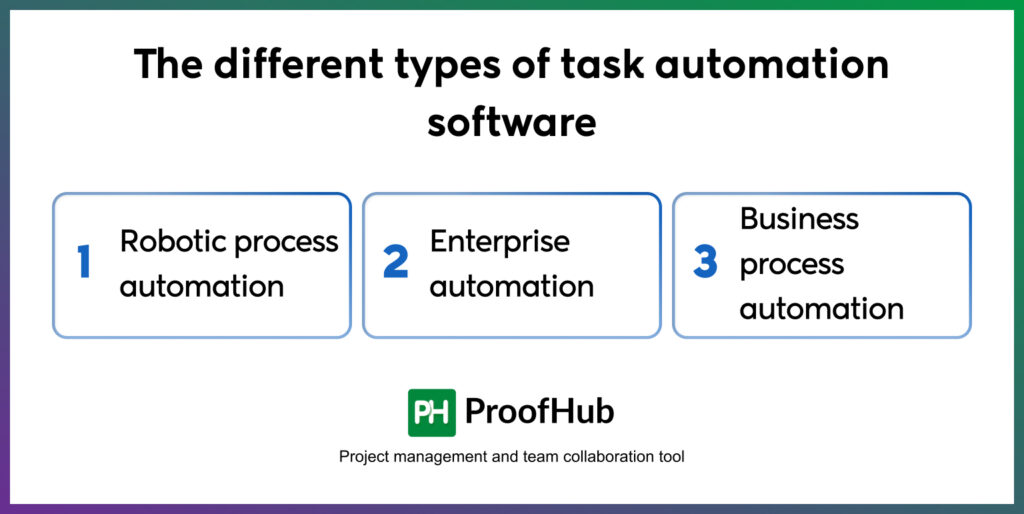
Task automation can be used for a variety of purposes and reasons. They can be used to automate tasks and simplify carrying out the tasks.
The most common types of task automation software are:
1. Robotic process automation (RPA)
Robotic Process Automation is software that automates repetitive tasks. It can automate repetitive and time-consuming tasks such as data entry, customer service queries, and IT support.
It is software that can automate many tasks in an organization. It can help streamline the processes in an organization by eliminating redundant work and freeing up human resources for more critical tasks.
Hence we understand that RPA is software that automates operations generally performed by people. It operates by creating a link between the program and its user interface.
RPA is a task automation software that can automate processes generally performed by people. RPA was created to work in companies by developing a mapping between the program and the application’s user interface. It was designed for workflow automation and process simplification.
2. Enterprise automation
Enterprise automation is the process of automating business processes to increase efficiency. It is a way to streamline operations and make the most of employees’ time.
The two main types of enterprise automation are process automation and IT management. Process automation focuses on improving business processes such as human resources, customer service, and finance. IT management helps companies with their information technology needs, such as security, data backup, and system optimization.
The software can automate things like scheduling meetings, sending emails and documents, updating CRM records and much more. The benefit of this is that the employees have more time to do high-value work in their areas of expertise.
3. Business process automation (BPA)
BPA, or Business Process Automation, is a part of the business process management (BPM) discipline, which allows you to automate a wide range of tasks. However, it, like RPA software, has certain significant flaws.
For example, it requires technical knowledge to use, which prevents the entire team from taking advantage of the platform. This will almost certainly result in bottlenecks and delays in automation delivery.
How to choose the right task automation software?
Task automation tools can be a great way to streamline your work and increase productivity.
There are many different types of task automation available. However, it is crucial to find the right software for your needs. Choosing the right task automation for your needs is not easy, but it will help you streamline your work and increase work efficiency.
The selection process will vary from business to business as verticals and needs change. Nonetheless, just like any other process, you must create a set of criteria for the software that meets your business’s needs. Some general tips for creating such a framework are as follows:
- Simple & Clean UI/UX
- Easy Integration with other tools/platforms
- Multi-device access (web/mobile)
- Robust Search & Report Functions
- Integrated notifications alert via email
- Recurring task scheduling capability
- Weekends and holidays are taken into account in real-time scheduling
- Customizability without having to code
In conclusion: What does the future hold for task automation?
The future of task automation is bright. More companies are beginning to adopt this technology to streamline their workflows and increase productivity. The main goal is to free up their employees, who can focus on tasks that need a human touch instead of repetitive, mundane tasks that robots can take care of better than humans can.
Many companies and industries have already started to use task automation for various purposes. One of the main reasons for this is eliminating human error, which can be time-consuming and costly.
The world is rapidly evolving at a breakneck pace; businesses need to keep up with the change if they want to win. Ergo, the adoption of task automation software becomes an inevitability of gargantuan proportions. You either use task automation to streamline your business processes and make them more efficient & effective or fall behind the rest. The question is not if you will use task automation or not; the question is when.

